China Admissions interviewed US student Michael Cogan who has just graduated from his MBA program.
Hi Michael! Please can you introduce yourself?
I: My name is Michael Cogan. I’m 28 years old and I actually started career by joining the US Military. I was in the army from when I was 17 all the way through the end of undergrad. I’ve always had an interest in China but never really had a means to come here up until recently when I decided to go my MBA at SMU in Dallas, Texas. They had this exchange program with CEIBS and I kind of took it from there. That’s kind of how I got involved in China.
What is life like in Shanghai? Check out Shanghai City’s official video below:
I wanted to go to Asia, I didn’t even realize there were English speaking MBA programs, so I never really considered it.
Q: Why did you choose the MBA?
I: I was working as a project manager for USAA which is a financial services company in Texas and they covered the whole US. It was a great job and I was pretty content—I was making good money, had a nice apartment but I just wasn’t happy, I felt like I was missing something. I had kind of always wanted to go to Asia. The potential really wasn’t there in my current company and I thought okay, what’s some way I can make a big career change but also in a way that can help me move up in the world and help me maybe find more career opportunities and explore that? And an MBA was kind of the right option primarily because with an MBA there are so many difficult opportunities, it’s not like when you do an MBA you just go into consulting, right? There’s a million different opportunities out there and there’s opportunities across the world.
And so, it was kind of the right fit for me especially as I was learning more and more about business being in the role that I was in. And so, from there I started looking at different programs and it’s so funny because at the time as much as I wanted to go to Asia, I didn’t even realize there were English speaking MBA programs, so I never really considered it.
Q: I think a lot of students are like that.
I: Who would imagine there was an English speaking MBA program in China, right? Maybe now people know about it more because the reputation is started but, you know, you just never think of it, at least as an American.
What you would see happening in 10 years in America will happen in 1 or 2 in China.
Q: Can you talk about your interest in Asia?
I: It’s funny because I’m probably asked this three or four times a week, almost every time I meet somebody new. There’s obviously some reasons that are easier to explain than another and a million, million different reasons but some of the majors, I won’t just leave you with nothing, but from China specifically, looking at it from a professional standpoint, the most amazing thing to me is be involved in watching the business out there. It’s like what you would see happening in 10 years in America will happen in 1 or 2. You’ll watch a company go from nothing to half the size of Google and then they’ll be back to nothing in such a short period of time. It’s incredible to see.
And you see some of the most brilliant minds and some of the most brilliant ideas out there. It’s kind of like you’re watching this startup and suddenly they go from nothing to insanely popular and then you have 100 companies trying to do the same thing and you have these people fighting to see who can make the business better and better and better. And it’s so competitive and so fast paced. And as a business student, there’s so much value in that.
You learn so much about how to run a business, that if you bring those kind of skills to other countries like the US you become invaluable. So, from a professional standpoint, that’s one of the major reasons. From a personal standpoint, I’d say my top three are probably 1) I think it’s just incredibly beautiful. I mean, the most beautiful mountains I’ve ever seen in the world are in China. Some of the most beautiful cities, most beautiful buildings. It’s all there and everything is so new, clean and safe as well. Generally you can walk around at 2 or 3 in the morning and nobody’s ever going to bother you. And especially with all the technology now, you don’t really have to worry about having cash stolen or anything like that because everything is on your phone.
Kind of along with that is the living quality there is just wonderful. I love it. I love that I only have to carry around my phone. I love that even though there’s a language barriers, there are so many ways to overcome it now. You can use the apps and WeChat to order food instead of talking to a person, you can use the English version of Didi and the driver generally knows that you can’t really speak Chinese. It’s come such a long way and it’s so enjoyable to live there. And it’s so different.
Q: What do you think about living in Shanghai?
I: I definitely think it’s different from the rest of China but it’s probably one of my most favorite places in the world. It’s like I think for an American, quite challenging in that many Americans, maybe many Westerners in general won’t really understand China unless they go there themselves. So, many people who visit it I think generally have a kind of hard time understanding why people are the why they are, why people act the way they do. You’re not going to a restaurant and have someone ask how your day is easily, they’re going to give you your food and they’re going to go on and if you want anything, you’ve got to get their attention, right? Things are very different.
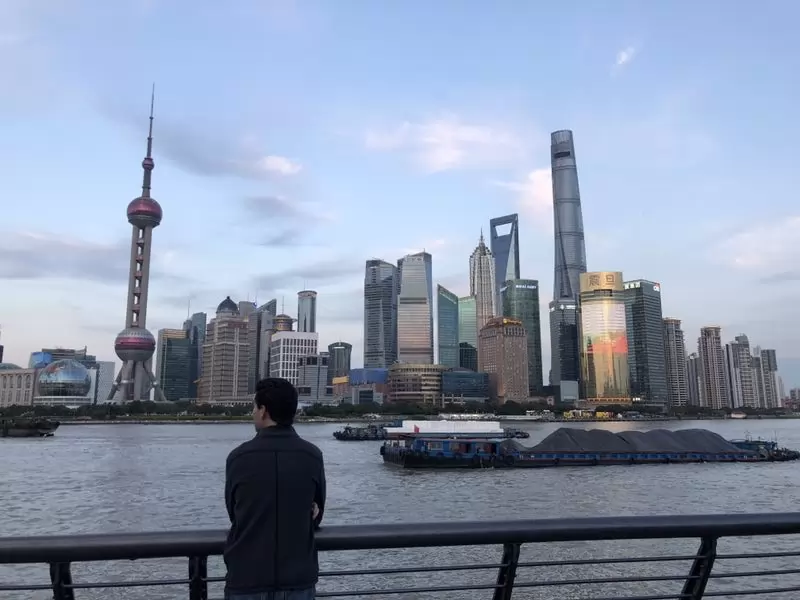
- Michael overlooking the bund central Shanghai
For me, it’s almost refreshing and I like to have something challenging. And Shanghai makes it a little bit easier because you still have access to Western things if you needed it as a Westerner. Of course, there’s Chinese food there and there’s great Chinese food but there’s also great American food, they have Shake Shack now there, they had PF Changs, I don’t know if it’s still there. They have Italian food. It’s a really, really interesting culture and a very comfortable place for me. I just love it.
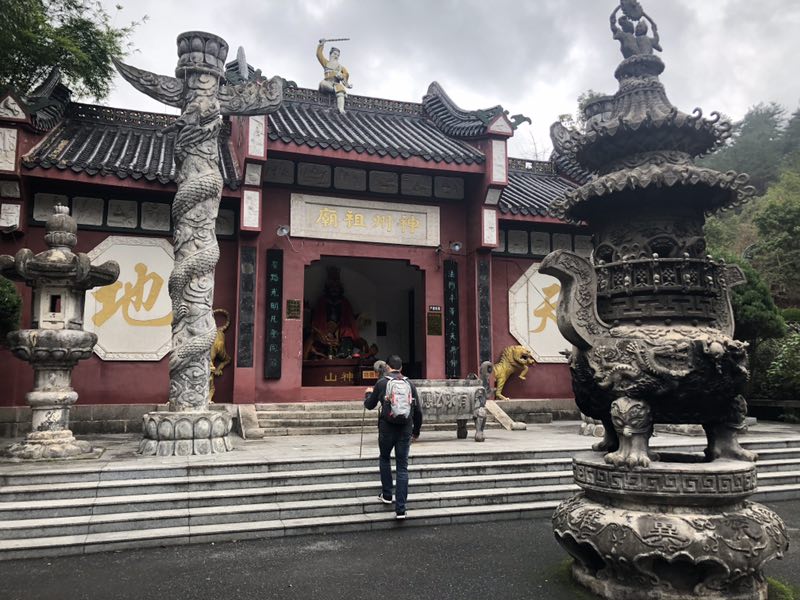
- Mike travelling in China
The biggest thing specifically to Shanghai for me is all the different creative things there are to do. I feel like I never get bored. I’ll give you one example. They had this murder mystery thing, it’s kind of like an escape room and you get like a role that you have to memorize and they lock you in a room and you try to get out and then somebody gets fake murdered and you have to work with the other people to try and solve it and figure out what happened. It’s brilliant. And you see cool, cool stuff like this all over the city that’s popping up. There’s just always something to do.
Q: What are your future plans?
I: Well, right now I’m about to finish my MBA. I’m taking my last class. My final exam is April 30th. As soon as I’m done that I will be coming back to Shanghai. I probably won’t have a job yet because right now I’m completely 100 percent intent on getting a job in Shanghai. I’m trying to find a job out there and I’m working with some people. I do have a couple of interviews lined up for once I get back out there. But right now, my near future is just being in Shanghai.
What I would like to do is preferably work for either a university in some sort of like admissions role or in the technology field. It kind of depends on what’s available. Again, because my priorities are more about location right now than anything. It’s quite funny because so many of my classmates here in the US kind of think I’m crazy—none of them want to come to China. I have a big passion for it and that’s kind of the dream I’m following right now.
Q: Did you do work experience in Shanghai?
I: I have a little bit, yes. I came to Shanghai and the end of August and I went to a couple of different jobs. I was trying to find like an internship that I could do while I was out there. And I managed to land one and started in October working at a place called Property Passbook. These guys are pretty much a startup. They do like real estate technology. They have the software that helps them find really, really great real estate investments and then they help people invest in these properties. They’re usually properties in different countries so they help you find lawyers or agents, property managers, whatever it is that you need and they kind of walk you through that.

And I got to work on a couple of different roles. My main role was managing the website development. I was a project manager for that. It was a really unique and amazing experience in that I would say 50 percent of the employees were Chinese and the other 50 percent were from all over the world. You really don’t see that at a lot of American companies. We have people from Singapore, we have people from France, from Poland, from Hong Kong, Germany, Canada, US, you name it, everywhere. That’s just an experience that I’ve always wanted.

Q: Can you tell me about CEIBS and what it was like studying there?
I: Sure. I remember when I first got to CEIBS I was already getting invited to events and I thought that was so cool because when you come to a country or at least a city that you’ve never been to, I had been to China but never Shanghai, you kind of know that it’s a little hard to adjust. I felt so welcome because they gave me a couple of people who were willing to help me, who spoke Chinese and could go with me and set up bank account and could help me get my SIM card and that all set up and kind of tell me how things work out there.
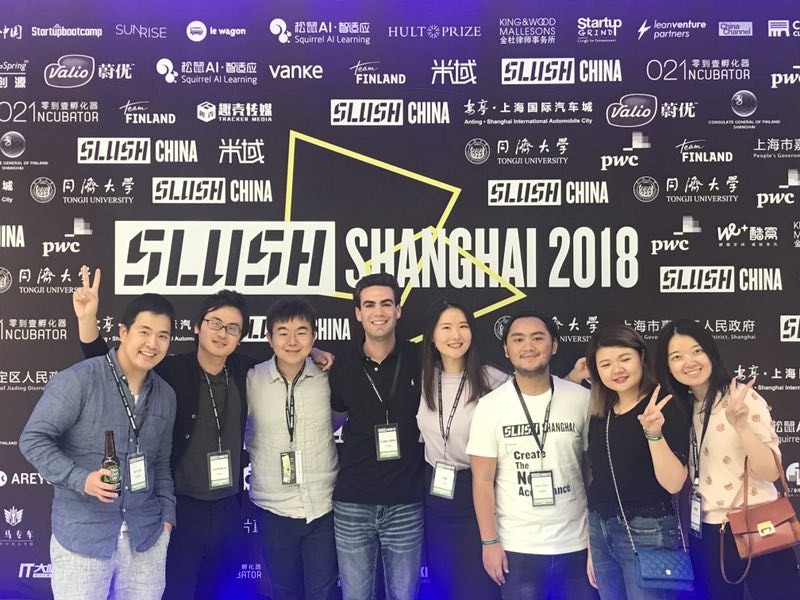
- Michael and his friends at Slush Shanghai – an business event in Shanghai

- Michael and his friends receive awards
But then more so, they created a lot of opportunities for students to meet each other. What you kind of realize as you get to meet these people is every single student at CEIBS had an incredible background. Whether or not each of them thinks that is their own prerogative. From an outside perspective, I mean, we have these people like who knows Japanese, Korean, Chinese and English and they’ve worked in like five different countries and have had these incredible educations and these incredible experiences. And getting to meet those student and hang out with those students, have dinner with them, do projects with them was probably one of the most amazing things I could ever ask for and one of the most amazing things about CEIBS.
Q: What’s the mix like between Chinese and international?
I: I would say in our class—and when I say our class I mean fulltime CEIBS 2020—I don’t know what the exact numbers are but I think it’s like over 50 percent at least, maybe 60 or 70 Chinese. I would say another good portion is like overseas born Chinese, mostly Canadian and US. And then maybe 5 to 10 percent Indian, 5 to 10 percent European, like French and German and maybe another 5 to 10 percent US.
So, you definitely still get your Chinese taste but it is an English speaking school so it’s quite nice. I think the mix is generally pretty healthy. I know they’re trying to move even more towards international but the amount of Chinese students they have in my mind was quite helpful especially when you get group projects where you maybe study a Chinese company, you have people usually in your group who not only speak Chinese but probably have been utilizing the products that those companies offer for some time.
It’s taught me that the people that are running these successful companies like Luckin or Mobike are geniuses.
Q: What are the main things you learn about Chinese companies and doing business in China?
I: The biggest thing I learned is if you’re going to start a company and you become successful, you have to work your butt off to stay at the top otherwise somebody is going to do the same idea as you and they’re going to figure out a way to make it better and knock you out of the water really fast, I mean within months.
And it’s taught me that the people that are running these successful companies like Luckin or Mobike are geniuses. And it’s so much fun to study what they’ve done and what is happening with these companies which is what we did at CIEBS—we study these companies and you see the unique creative ideas that they’ve come up with.
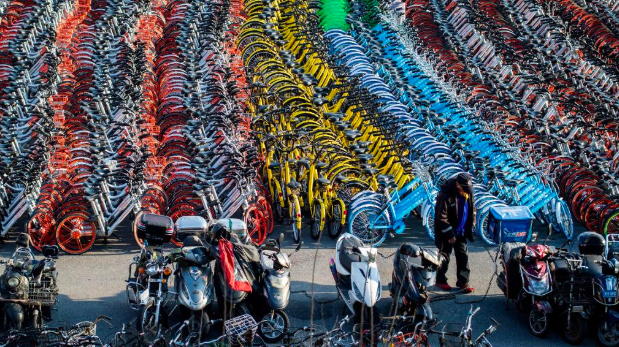
Like Mobike for example, we were studying them and we learned that they basically sell information to the Chinese government about what the patterns are like of people riding their bikes and so that the government knows where to put more bus lines or metro stations, things like that. It’s genius.
Q: What do you think about bike sharing?
I: I think it’s been in a rough patch up until recently. I think now it seems to be in a pretty healthy place. I don’t see a million bikes around like I used to. It seems like especially once Ofo is completely off the streets, which they’re getting there, the Mobikes don’t look like crap for the most part and I think the only other one I’ve really seen is Hello Bike. I’m pretty happy with where’s it at now. If I could change anything with it, I would say maybe get rid of these green electric bikes because those seem pretty crappy and I don’t think the business model is great with those. I think they literally have somebody manually come around and replace the batteries which is kind of ridiculous to me.
But other than that, I’ve used Mobike plenty of times. It helps me to get to CEIBS from the subway station as long as it’s not freezing cold out. So, definitely by no means would I ever want it to go away.
Q: How about Luckin? How does that compare with Starbucks in China?
I: That’s a tough one. We literally had a class, like six hours of discussion comparing Starbucks and Luckin. I still don’t know how I feel about that. Because Luckin, it’s incredible that it’s gotten to where it is. It truly is. And Starbucks has officially recognized it as a competitor in China. But at the same time, I don’t think Luckin has established itself as like a place you can just go and hangout and talk to people and use your computer like Starbucks has. Even though you can.
And with that in mind, I think they can coexist at least for a good amount of the near future where Luckin maybe the preferred delivery coffee and Starbucks would still be the preferred go in the café sit down quite place.
Q: What is the curriculum like at CEIBS?
I: I think in many ways it’s similar at least to my US MBA experience where what you first do is primarily core classes and you’ve kind of got to get the basics out of the way like finance, economics, accounting, all that. And generally people aren’t as big fans of those classes and I think that’s for any school. CEIBS is no exception.
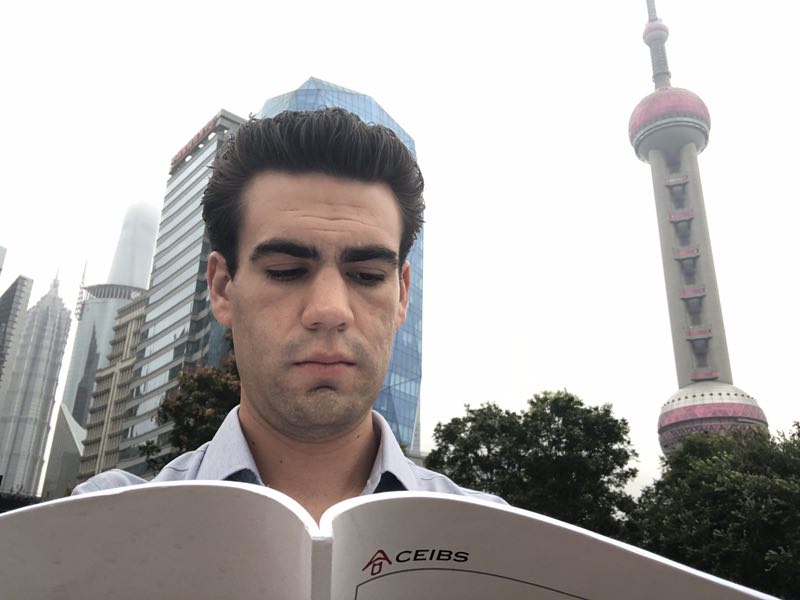
- Michael reading a CEIBS handbook
CEIBS students are getting a global education, a real global education.
What makes CEIBS curriculum unique is that they have so many opportunities for what they call overseas modules. And I think literally every semester students are getting to go to every major country in the world. I have a friend that’s in Japan right now, friends that are in Singapore, the US even like Silicon Valley. And they go there to visit companies, learn about how business is out there.
There are some US programs that really try to do that, my home school is an example. We have one overseas modules that’s required and everyone does that but the others ones, you know, it’s a little harder and not many people are participating in. Whereas CEIBS, it’s so encouraged and I think part of their curriculum requires you to do so many overseas things that all the students are really into this.
Moreover, they actually really encourage exchange. I think the majority of CEIBS students go on exchange during their second year. It’s really cool and I mean, they’re fighting to go to these schools. And so, these students are getting a global education, a real global education.
Q: What was the application process like for you to apply at CEIBS?
I: It wasn’t bad for me because my home school is in Dallas and nobody else wanted to go, nobody was really interested in going to mainland China so I pretty much just told the global programs office in my school, hey, I’ve been wanting to go Asia, I want to get a job out there, what schools do we have out there, what are the options? And it came down to basically CEIBS is the best option and I said, “Okay, send me there.” And they said, “Alright, we’ll nominate you.”
Usually you have to write a little essay or blurb about why but I had been in there so many times and talked to them that they already kind of knew I was really serious about it. If you ever get to the chance to meet, I’m sure you’ll see the passion in my eyes to go there. And so, they said they’d recommend me and if CEIBS is okay with it, you’ll be going there.
Sure enough, a couple of months later I got an email from CEIBS and as soon as I got that email, I started organizing everything to go out. So for me, maybe it’s a unique story but it wasn’t hard for me.
You can survive without Chinese only because Chinese people are nice enough to help you when you need it.
Q: What do you think about the language? Do you need to speak Chinese living in Shanghai and how is your Chinese?
I: You don’t have to. You can survive without Chinese only because Chinese people are nice enough to help you when you need it. That is the main point I’ll make. If you live in China long enough, there is going to be times where you have to communicate something to someone that doesn’t speak English and it’s going to be complex. I had them mess up my plane ticket once and they didn’t have any English customer service, thank God I had Chinese friends who could talk to them and sort out the problem.
Yes, Chinese is not required to live there but I think anybody who’s actually planning to live in China should do everything they can to learn it. And that’s what I’ve been doing. I started taking private lessons I think in October and before that I was kind of just doing self-study and like audio lessons online, things like that. At this point I’ve done a couple of hundred hours and even right now I’m still continuing class.
Sitting around HSK3, trying to get to 4 right now. My hope is that at some point to become fluent. I’m never going to stop studying probably my whole life or at least as long as I live in China.
So, not only did it far exceed my expectations and I didn’t expect to be able to make friends with as many people as I did.
Q: Is it like what you expected it to be like?
I: No, not at all honestly. I think most people will say that. I had only ever been to China once before and it was Beijing. Anyone who’s been to Beijing and Shanghai knows they’re completely different. I had watched a lot of videos online, trying to get a good idea of how Shanghai was. I expected not to be able to found milk anywhere, to not be able to find ice. All these things. Not being able to find Western toilets and things like that. And that totally wasn’t the case.
So, I went in with this expectation of things being very similar to like a rural Chinese village even though it was a city. I was so surprised because everything was so modern and so high-tech, so clean. I’m trying to think of the right word. I guess modern wouldn’t be the most correct word. It’s like if you want to live there and you have enough money, you can live however you want. If you want a soft bed, because most people don’t really have soft beds there, you can go buy one. If you want a Western toilet and your apartment doesn’t have one, you can go buy a Western toilet. It’s just like any other comfortable first world place. It’s wonderful.
So, not only did it far exceed my expectations and I didn’t expect to be able to make friends with as many people as I did. There are so many friendly people there and plenty of people who speak enough English that you can be friends with them too. It’s a wonderful thing.
Q: Have you travelled much in China?

- Michael and his friends on a trip in the mountains
I: I did. I travelled quite a bit. The first place I went was Suzhou and I was there for a few days. I went to Hangzhou as well. I went to Changsha. Another city out of Changsha. I hiked a mountain called Huangshan. I went to some village. This was a separate trip but some village maybe a couple of hundred kilometers away from Hangzhou, I think it was still part of the city. I got to go to Hong Jong and Japan and Korea also. Kind of all over. I went to Beijing again, it was great. There’s still a million more places I want to go.
Q: Is there anything else you’d like to talk about or like to say?
I: Let’s see. Advice for anyone even coming to just visit Shanghai, of course there’s the obvious tourist things to do like go see The Bund and the Jing’an Temple and all those popular things. But if you can, especially if you know Chinese well, ask what some of the more local things to do are, like that murder mystery I mentioned or go see a concert. It’s like that Chinese instrument. There’s so much more to that city I think than a lot of people realize. I think it’s worth doing more than just the tourist things.
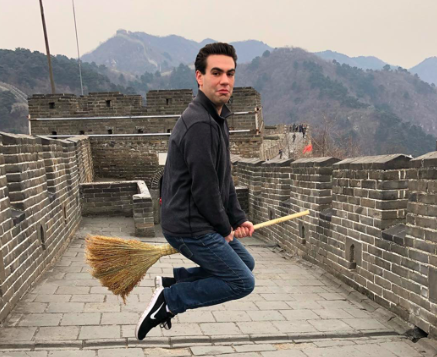
What I tell a lot of my Western friends who just visit China is if you go to China and you just go to the Great Wall, at least most of the Chinese people you’re going to see at the Great Wall are also tourists and they’re not from the major cities and they’re going to very, very different than the locals in Shanghai or Beijing. And Chinese people are so, so diverse but if you’re a foreigner coming to China for the first time and that’s all you see, you can’t generalize Chinese people like that and it’s such a shame because a lot of my friends are like, “Oh, yeah, I went to Beijing for like a day and I was at this buffet and all these people were pushing and shoving me, I think everyone in that city is rude,” well, it’s like that’s not the case. I can’t stress that enough to people. It’s a little hard to explain but I just hope that people don’t generalize all the Chinese when they visit just by the ones that they see at the tourist sites.
______________
Thank you Michael, for sharing your thoughts
If you are interested learning more about CEIBS, about the MBA Program or the Summer Program, complete the form below and we will get back to you with more info.
CEIBS Registration Form
- China’s Top 10 MBA Programs & 2024 Application Deadlines - September 14, 2023
- How To Fund an MBA in China - December 22, 2020
- 12 Top MBA Programs in China for International Students - November 10, 2020
